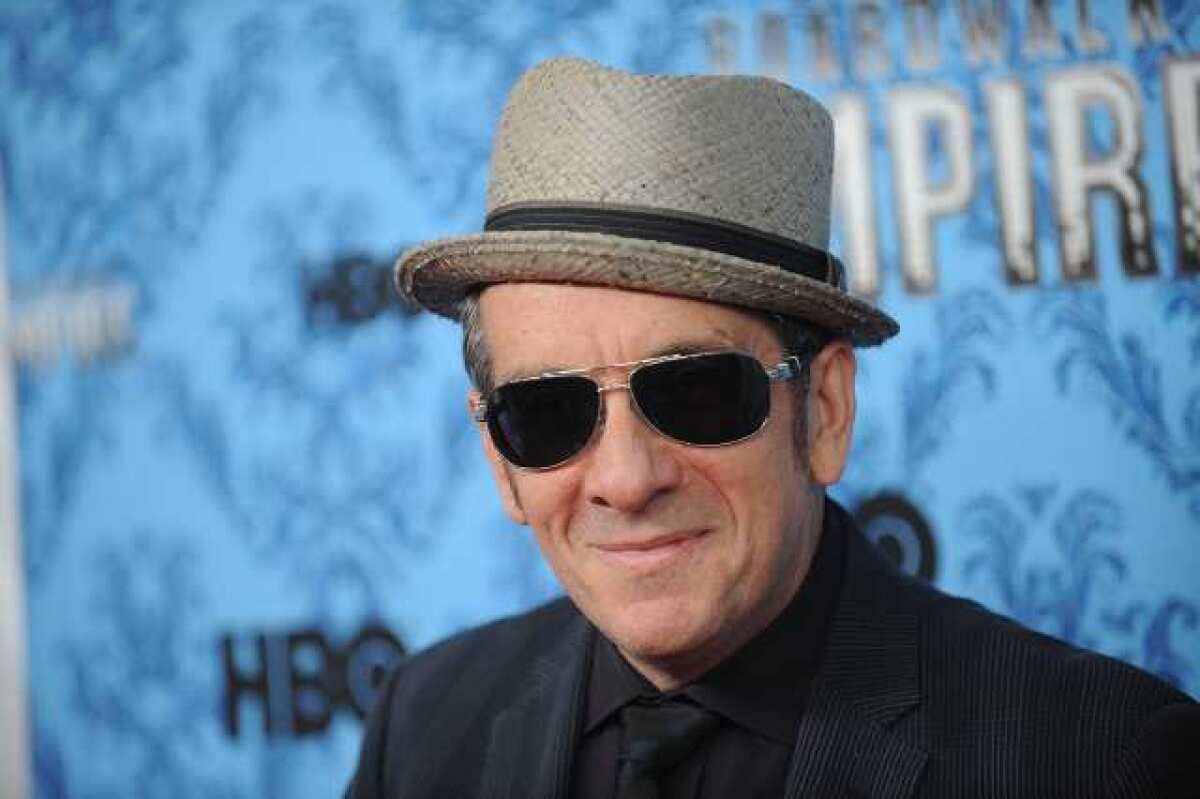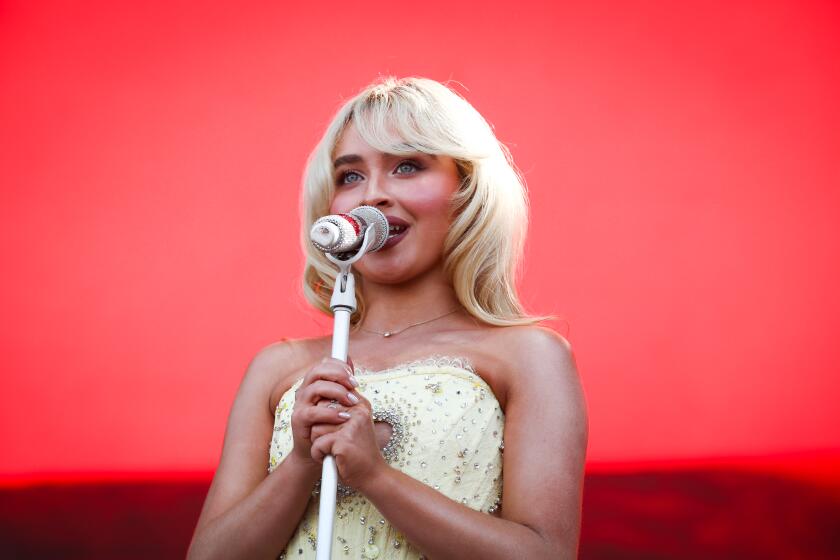Review: Elvis Costello solo at Irvine Barclay Theatre

Elvis Costello’s been part of the pop music landscape for so long now, and has written and recorded so much, it can be hard at times to remember what it was like before he elevated the game with his razor wit, impeccable compositional skills and kiln-hot passion.
The pre-Elvis age probably feels like another era to many -- as indeed it was before his explosive debut in 1977 -- and that may be the inspiration for the cheeky title of his current solo tour that stopped Tuesday night at the Irvine Barclay Theatre: “2054 -- the Centenary Tour.”
But even though 100 years haven’t passed literally for the often-brilliant, engaging English singer and songwriter, he did tip his stylish raffia boater hat to nearly a century’s worth of musical tradition. His performance in a lot of ways was the B-side to his dazzling “Spinning Songbook” tour, which played the Wiltern Theatre in L.A. in April, and which was brimming with production value and the expansive musical contributions of his longtime bandmates the Imposters.
PHOTOS: Celebrities by the Times
For the solo performance, he came onto a stage outfitted with half a dozen guitars -- all hollow-body acoustics or acoustic-electrics, until the encore segment, when his guitar tech brought out his signature Fender Jazzmaster solid body instrument, which nevertheless went unused. He also had at his disposal an electric keyboard that he played for a couple of songs and a ukulele that he gently plinked on toward the end of the set.
He opened with “(The Angels Wanna Wear My) Red Shoes,” frenetically strummed as though he were Pete Townshend, a technique employed periodically through the show. He messed liberally with melodies as well as with the chord progressions of his better-known songs, injecting surprising changes into songs that heightened the sense of in-the-moment freshness.
If there was a downside to a consistently inspiring choice of material and arrangements, it was the curious intonation deficiency in his vocals.
LIVE REVIEW: Elvis Costello at the Wiltern Theatre
Costello is one of rock’s most expressive singers, but Tuesday he sang consistently about a quarter-tone flat, suggesting some technical idiosyncrasy of the in-ear monitor system he was using. When, on a couple of occasions, he stepped away from the microphone and sound system, the melodies were back in the pitch range they should have been in all night.
As for the scope of the evening, Costello not only touched on cornerstone numbers and obscurities of his own, but he also dipped back to pre-Elvis, pre-Beatles, pre-the-other-Elvis and prewar tunes that illustrated his familial roots in the riches of both the Great American Songbook and England’s dance hall and music theater traditions.
In some of the most engaging moments of the show, he spoke about his father -- a hard-gigging trumpeter -- and his grandfather, a vaudeville-era singer and instrumentalist who, as Costello told it, was left basically unemployed when talkies arrived in the late ‘20s and did away with the need for the live musicians who typically provided the musical accompaniment during the exhibition of silent films.
PHOTOS: Celebrities by the Times
“My grandmother hated Al Jolson,” Costello said. “She single-handedly blamed him for putting my grandfather out of work.
“You may have noticed a theme of revenge in some of my songs,” he said, drawing gentle laughs from the sold-out house. “But compared to my grandmother, I’m an amateur.”
That led into his moving 1989 song inspired by her, “Veronica.” Family also figured prominently in another of the night’s most touching moments, one that did make it seem briefly possible that he’s a century down the line -- emotionally speaking, anyway -- from where he started out as the angry young man of the new wave movement.
“Day is closing/Old men and infants are dozing/That’s the kind of life I’ve chosen/To see what I’ve become/the humble father of my three sons,” he sang without a trace of irony or cynicism in reference to the latter-day family he and his wife, jazz singer-pianist Diana Krall, have created in the last few years.
He picked up the uke and dropped his delivery to a near whisper on a straight-from-the-heart, old-school love song that seemed targeted to her: “I Know Why (And So Do You),” a Harry Warren-Mack Gordon hit for Glenn Miller in 1941. Costello said he had scored the sheet music for the number, which he showed off, a few days earlier in a thrift shop as the Centenary Tour took him through Arcata in northern California.
This is the man who famously sang out of the gate 35 years ago, “Oh I used to be disgusted/Now I try to be amused.” Obviously, he hasn’t lost his ability to slice and dice targets of scorn wherever he finds them. But today, he seems equally as fascinated with exploring how to love, and be loved. It’s been a long time coming.
ALSO:
Blur’s Damon Albarn wants you to see more opera
Spotify exposure pays off for Mumford & Sons’ ‘Babel’
Esperanza Spalding to host show on Magic Johnson’s TV network
PHOTOS AND MORE:
PHOTOS: Iconic rock guitars and their owners
LISTEN: James Bond songs by British artists
PHOTOS: Unfortunately timed pop meltdowns
More to Read
The biggest entertainment stories
Get our big stories about Hollywood, film, television, music, arts, culture and more right in your inbox as soon as they publish.
You may occasionally receive promotional content from the Los Angeles Times.










